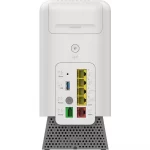UK ISP Hyperoptic Scraps Static IP for Shared CGNAT Internet Addresses
Fibre optic ISP Hyperoptic, which is rolling out a 1Gbps Fibre-to-the-Building (FTTP/B) broadband network to 500,000 UK premises in 20 UK cities, has stopped giving customers a Static IP (IPv4) address and instead become one of the first to adopt Internet address sharing (Carrier Grade NAT).
Everybody needs an Internet Protocol (IP) address to go online and your ISP is responsible for assigning one to your connection (it’s the Internet equivalent of a phone number). Most fixed line ISPs tend to use Dynamic IP addresses for domestic connectivity, which usually changes each time your broadband link is disconnected and isn’t shared with other subscribers (i.e. not at the same time you’re using it).
Advertisement
However Hyperoptic has generally tended to offer a Static IP (IPv4) address with new connections, which stays the same no matter what happens to your physical link and this is normally considered to be more of a premium (business) feature. But the ISP’s customer base is growing rapidly and they’ve just begun to inform subscribers of several big changes (see below for a copy of the letter that was sent to ISPreview.co.uk).
Hyperoptic’s Letter to Customers
Dear ************,
We are writing to you today to inform you of some changes to your Terms of Service which are taking place today. As we continue to invest in and grow Hyperoptic, it has become necessary for us to adjust some of the terms of the agreement we have with our customers to maintain the high levels of service and support you’ve come to expect from us.
The full Terms & Conditions can be found at https://www.hyperoptic.com/terms-of-service/, and the revised prices here, but a summary of the main changes are:
– Customers are now issued a dynamic IP address instead of a static IP address
– A static IP address is available at extra charge
– Early contract termination fees have increased
– Hyperoptic’s Office address has been updated
– Amendments have been made to ensure compliance with current consumer rights legislationYour existing monthly charges with us have not changed as a result of these changes, and your broadband service will continue to be provided on the updated Terms of Service.
Under your Terms of Service, it’s important to ensure that you’re made aware of any changes made to your agreement with Hyperoptic.As an existing Hyperoptic customer, you do not need to take any specific action, but if you do not wish these changes to apply to you, please let us know in the next 30 days if you want to end your service (in which case your agreement with us & your broadband service will end 30 days after you give us notice).
We hope that you continue to enjoy your service supplied from Hyperoptic. If you have any questions about this, please forward your reply to support@hyperoptic.com.
Kind regards,
Steve Holford
Chief Customer Officer
The letter mentions several negative changes. Firstly, the termination fee for those still within a contract will now cost £20 per remaining months of your contract period for ‘Broadband only‘ and £25 for ‘Broadband and Phone‘ bundles. Secondly, anybody who now wants a Static IP address will be charged a hefty £5 extra per month. Quite a hike considering that it was previously an included feature.
At this point we normally wouldn’t be too worried about the adoption of Dynamic IP addresses because they’re quite normal for residential connections. Similarly the depletion of IPv4 addresses, as well as Hyperoptic’s notable lack of IPv6 support (even if they have been telling Twitter users since 2014 that it’s “coming soon“), is an obvious reason for the change.
However, according to Hyperoptic’s support department, the new Dynamic IP addresses will be based off Carrier Grade NAT (CGNAT), which is something that BT piloted for a large chunk of their broadband subscribers all the way back in 2013 and it wasn’t exactly the most popular move (here).
Advertisement
https://twitter.com/HyperopticCS/status/780430979315929088
In simple terms, the Internet’s phone number system is being split between two incompatible standards (IPv4 and the newer IPv6) and in order to continue adding new connections some ISPs will need to ration their remaining IPv4’s and or share one address between several users (CGNAT).
ISPs can run a dual-stack network so that IPv6 and IPv4 addresses are able to communicate, but they’ll all still need to support IPv4 until IPv6 adoption becomes truly universal (otherwise you’d risk shutting off part of the Internet to those who can only get online via one of the two standards).
However the concern with CGNAT is that some Internet services don’t play well with shared IP addresses, which are often used to identify your connection as part of security checks, automated processes and other Internet content related interactions.
Advertisement
For example, two users with the same IP address would not be able to vote in some online surveys (only the first vote would count) and you might not be able to login to certain online games or services if somebody else with your IP is already using it. Similarly if another user with your IP is banned from a service by their address then that would affect your connection too (a router reboot may force the IP to change, but that’s not ideal).
Essentially the problems arise because most of the affected services assume that everybody will have a unique address (the end-to-end approach), which is broken by CGNAT. We explained a lot more about the pros and cons of this back in 2013, when we also got feedback from a number of ISPs and the responses remain very relevant (here).
In reality CGNAT is highly likely to become a necessary evil until such time as IPv6 reaches truly universal adoption, although some of the biggest ISPs may have enough spare IPv4 addresses to stave off CGNAT adoption until much later (unless they’d rather sell them off for £££).
The good news is that rising levels of IPv6 adoption and more sophisticated Internet services, which can work better with CGNAT, mean that the change is not as bad as it once was. Indeed most Internet users might not even notice the use of CGNAT, although there will certainly be some that do.
We have long suggested that ISPs which adopt CGNAT should do so gradually and give existing customers the option to disable it, without incurring an excessive charge, if it causes problems for their use of the Internet. Most will inevitably leave it enabled, but at least this would give subscribers some flexibility to adopt.
We asked Hyperoptic for a comment yesterday afternoon and are waiting to hear back.
Mark is a professional technology writer, IT consultant and computer engineer from Dorset (England), he also founded ISPreview in 1999 and enjoys analysing the latest telecoms and broadband developments. Find me on X (Twitter), Mastodon, Facebook, BlueSky, Threads.net and Linkedin.
« UPDATE2 Virgin Media Prepping 300Mbps Home Broadband Upgrade
















































Comments are closed